-
For support, write to us on: admin@taxsutra.com
- Register
- Login
Latest News
Government of India
Ministry of Finance
Department of Revenue
Central Board of Direct Taxes
******
New Delhi, 07th October, 2024
Press Release
Suggestions for comprehensive review of Income-tax Act
In the Budget 2024-2025 speech, the Hon’ble Finance Minister announced a comprehensive review of the Income-tax Act, 1961. The goal is to make the Act concise, clear, and easy to understand, which will reduce disputes, litigation, and provide greater tax certainty to taxpayers. An internal committee of the Income Tax Department has been formed to oversee this review.
The committee invites public inputs and suggestions in four categories: Simplification of Language, Litigation Reduction, Compliance Reduction, and Redundant/Obsolete Provisions. To facilitate this, a webpage has been launched on the e-filing portal with the following link: https://eportal.incometax.gov.in/iec/foservices/#/pre-login/ita-comprehensive-review
The public can access the page by entering their mobile number and validating it via OTP. Suggestions should specify the relevant provision of the Income-tax Act, 1961 or Income-tax Rules, 1962 (mentioning the specific section, sub-section, clause, rule, sub-rule, or form number), as the case may be, to which the suggestion relates under the aforementioned four categories. The web page is live and accessible to the public in the E-filing portal from 06.10.2024.
(V. Rajitha)
Commissioner of Income Tax
(Media & Technical Policy) &
Official Spokesperson, CBDT
Government of India
Ministry of Finance
Department of Revenue
Central Board of Direct Taxes
******
New Delhi, 21st September, 2024
Press Release
CBDT notifies Rules & Forms for Direct Tax Vivad Se Vishwas Scheme, 2024.
Hon’ble Finance Minister, in her budget speech, announced the Direct Tax Vivad Se Vishwas Scheme, 2024 (referred as DTVSV, 2024) to resolve pending appeals in the case of income tax disputes. The DTVSV Scheme, 2024 was enacted vide Finance (No. 2) Act, 2024. The said Scheme shall come into force with effect from 1.10.2024. Further, the Rules and Forms for enabling the Scheme have also been notified vide Notification No. 104/2024 in G.S.R 584(E) dated 20.09.2024.
The Scheme provides for lesser settlement amounts for a ‘new appellant’ in comparison to an ‘old appellant’. The Scheme also provides for lesser settlement amounts for taxpayers who file declaration on or before 31.12.2024 in comparison to those who file thereafter.
Four separate Forms have been notified for the purposes of the Scheme. These are as under:
Form-1: Form for filing declaration and Undertaking by the declarant
Form-2: Form for Certificate to be issued by Designated Authority
Form-3: Form for Intimation of payment by the declarant
Form-4: Order for Full and Final Settlement of tax arrears by Designated Authority
The Scheme also provides that Form-1 shall be filed separately for each dispute provided that where appellant and the income-tax authority, both have filed an appeal in respect of the same order, single Form-1 shall be filed in such a case.
The intimation of payment is to be made in Form-3 and is to be furnished to the Designated Authority alongwith proof of withdrawal of appeal, objection, application, writ petition, special leave petition, or claim.
Forms 1 and 3 shall be furnished electronically by the declarant. These Forms will be made available on the e-filing portal of Income Tax Department i.e. www.incometax.gov.in.
For detailed provisions of the DTVSV Scheme, 2024, section 88 to section 99 of the Finance (No. 2) Act, 2024 may be referred to alongwith Direct Tax Vivad Se Vishwas Rules, 2024.
This is another initiative by the Government towards litigation management.
(Surabhi Ahluwalia)
Pr. Commissioner of Income Tax
(Media & Technical Policy) &
Official Spokesperson, CBDT
Government of India
Ministry of Finance
Department of Revenue
Central Board of Direct Taxes
******
New Delhi, 20th August, 2024
Press Release
CBDT issues clarification in respect of Income-tax clearance certificate (ITCC)
Section 230 (1A) of the Income-tax Act, 1961( the ‘Act’) relates to obtaining of a tax clearance certificate, in certain circumstances, by persons domiciled in India. The said provision, as it stands, came on the statute through the Finance Act, 2003 w.e.f. 1.6.2003. The Finance (No.2) Act, 2024 has made only an amendment in Section 230(1A) of the Act, vide which, reference of the Black Money (Undisclosed Foreign Income and Assets) and Imposition of Tax Act, 2015 ( the ‘Black Money Act’) has been inserted in the said Section. This insertion has been made to also cover the liabilities under the Black Money Act in the same manner as the liabilities under the Income-tax Act,1961 and other Acts dealing with direct taxes for the purpose of Section 230(1A) of the Income-tax Act,1961.
There appears to be a mis-information about the said amendment emanating from incorrect interpretation of the amendment. It is being erroneously reported that all Indian citizens must obtain income-tax clearance certificate (ITCC) before leaving the country. This position is factually incorrect.
As per section 230 of the Act, every person is not required to obtain a tax clearance certificate. Only certain persons, in respect of whom circumstances exist which make it necessary to obtain a tax clearance certificate, are required to obtain the said certificate. This position has been in the statute since 2003 and remains unchanged even with the amendments vide Finance (No. 2) Act, 2024.
In this context, the CBDT, vide its Instruction No. 1/2004, dated 05.02.2004, has specified that the tax clearance certificate under Section 230(1A) of the Act, may be required to be obtained by persons domiciled in India only in the following circumstances:
(i) where the person is involved in serious financial irregularities and his presence is necessary in investigation of cases under the Income-tax Act or the Wealth-tax Act and it is likely that a tax demand will be raised against him, or
(ii) where the person has direct tax arrears exceeding Rs. 10 lakh outstanding against him which have not been stayed by any authority.
Further, a person can be asked to obtain a tax clearance certificate only after recording the reasons for the same and after taking approval from the Principal Chief Commissioner of Income-tax or Chief Commissioner of Income-tax.
In view thereof, it is reiterated that the ITCC under Section 230(1A) of the Act, is needed by residents domiciled in India, only in rare cases, such as (a) where a person is involved in serious financial irregularities or (b) where a tax demand of more than Rs. 10 lakh is pending which is not stayed by any authority.
(Surabhi Ahluwalia)
Pr. Commissioner of Income Tax
(Media & Technical Policy) &
Official Spokesperson, CBDT
Government of India
Ministry of Finance
Department of Revenue
Central Board of Direct Taxes
New Delhi, 7 th August, 2024
Press Release
CBDT relaxes provisions of TDS/TCS in the event of death of deductee / collectee before linkage of PAN and Aadhaar
The Central Board of Direct Taxes (CBDT), has issued Circular no. 8 of 2024 dated 05.08.2024, in view of genuine difficulties being faced by taxpayers. Vide the same, the Government has relaxed the provisions of TDS/TCS as per the Income-tax Act, 1961(the ‘Act’) in the event of death of deductee/collectee before linking of PAN and Aadhaar.
In order to redress the grievances of the taxpayers wherein instances have been cited, of demise of the deductee / collectee on or before 31.05.2024 and before the option to link PAN and Aadhaar could have been exercised, the Circular provides
that there shall be no liability on the deductor/collector to deduct/collect the tax under section 206AA/206CC of the Act, as the case maybe pertaining to the transactions entered into upto 31.03.2024.
This is in continuation of Circular no. 6 of 2024 dated 23.04.2024 issued earlier by CBDT wherein the date for linking of PAN and Aadhaar was extended upto 31.05.2024 for the taxpayers (for the transactions entered into upto 31.03.2024) to avoid higher TDS/ TCS as per the Act. The Circular No. 06 of 2024 dated 23.04.2024 and Circular No. 08 of 2024 dated 05.08.2024 are available on www.incometaxindia.gov.in.
(Surabhi Ahluwalia)
Pr. Commissioner of Income Tax
(Media and Technical Policy) &
Official Spokesperson, CBDT
Ministry of Finance
Celebrating Income Tax Day 2024: A Journey of Transformation
Budget 2024-25 Introduces Enhanced Deductions and Revised Tax Slabs
Posted On: 23 JUL 2024
What is Income Tax?
Income tax is a government levy on the income earned by individuals and businesses during a financial year. "Income" encompasses various sources, defined broadly under Section 2(24) of the Income Tax Act. Here’s a simplified breakdown:
- Income from Salary: This includes all payments from an employer to an employee, such as basic pay, allowances, commissions, and retirement benefits.
- Income from House Property: Rental income from residential or commercial properties is taxable.
- Income from Business or Profession: Profits from business or professional activities are taxable after deducting expenses.
- Income from Capital Gains: Profits from selling capital assets like property or jewellery are taxable. These gains can be long-term or short-term.
- Income from Other Sources: This includes income not covered by the other categories, such as savings interest, family pension, gifts, lottery winnings, and investment returns.
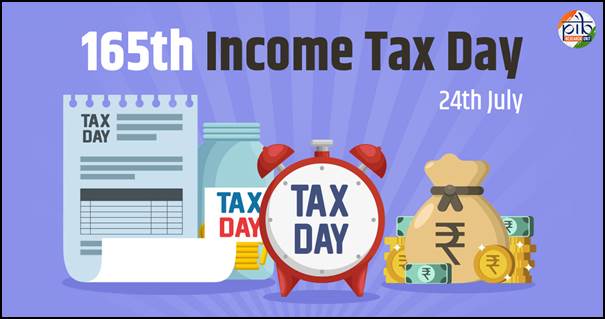
Background
Income Tax Day, celebrated on 24th July, marks a significant milestone in India's fiscal history. This day commemorates the introduction of income tax in India by Sir James Wilson in 1860. While this initial implementation laid the groundwork, it was the comprehensive Income-tax Act of 1922 that truly established a structured tax system in the country. This Act not only formalized various income tax authorities but also laid the foundation for a systematic administration framework.
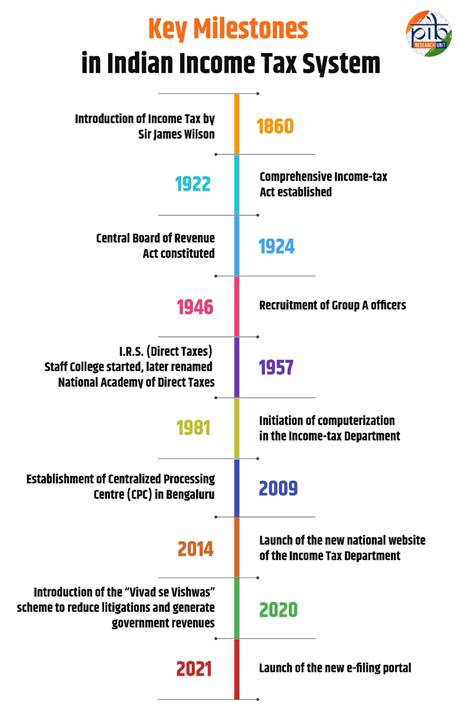
In 1924, the Central Board of Revenue Act further strengthened this structure by constituting the Board as a statutory body responsible for administering the Income-tax Act. This period saw the appointment of Commissioners of Income-tax for each province, supported by Assistant Commissioners and Income-tax Officers.
The recruitment of Group A officers in 1946 marked another significant development, with initial training conducted in Bombay and Calcutta. The establishment of the I.R.S. (Direct Taxes) Staff College in Nagpur in 1957, later renamed the National Academy of Direct Taxes, further strengthened professional development within the department.
Technological advancements also played a crucial role, with the introduction of computerization in 1981. This initial phase focused on processing challans electronically. Finally, in 2009, the Centralized Processing Centre (CPC) was set up in Bengaluru to handle the bulk processing of e-filed and paper returns, operating efficiently in a jurisdiction-free manner.
Income Tax Day not only honours the historical development of tax administration in India but also highlights the continuous advancements and modernization efforts aimed at creating a more efficient and taxpayer-friendly system.
Importance of Income Tax
Income tax plays a crucial role in nation-building by supporting the fundamental functions of an effective state. It provides the necessary revenue to ensure security, funding essential services like healthcare, education, and infrastructure. These services are vital for the well-being of citizens and the overall development of society. Additionally, the revenue from income tax facilitates economic development by enabling investments in various sectors, promoting growth, and creating job opportunities.
Taxation also influences the balance between wealth accumulation and redistribution, shaping the social character of the state. It helps in building and sustaining state power and establishing a social contract, fostering greater accountability between the state and its citizens. By requiring individuals and businesses to contribute a portion of their earnings, taxation ensures that resources are available for public goods and services, thereby enhancing social equity and cohesion.
Through tax reforms, governments can develop more responsive and accountable governance, expanding state capacity and enhancing legitimacy. Effective tax systems can lead to the development of policies that reflect the needs and preferences of the population, strengthening the bond between the government and its people. This accountability and responsiveness can create a virtuous cycle, where improved public services lead to greater trust in the government, encouraging compliance and further strengthening the state.
Thus, income tax is not only vital for revenue generation but also for creating effective, self-sustaining states capable of meeting their citizens' needs and promoting overall societal welfare. The importance of income tax extends beyond mere financial considerations, contributing significantly to the building of a stable, equitable, and prosperous society.
Current Landscape
The landscape of personal income tax (PIT) in India has seen significant growth over recent years, reflecting the country's expanding economy and improved tax compliance. In the financial year 2020-21, gross personal income tax, including the Securities Transaction Tax (STT), stood at ₹5.75 lakh crore. This marked a substantial contribution to the national revenue, even amidst the economic challenges posed by the COVID-19 pandemic.
In the following financial year 2021-22, there was a notable increase in gross PIT collections, which rose to ₹7.10 lakh crore. This growth can be attributed to the gradual economic recovery and enhanced tax collection mechanisms. The trend continued in 2022-23, with amount reaching ₹9.67 lakh crore, demonstrating the effectiveness of ongoing tax reforms and the buoyant economic environment.
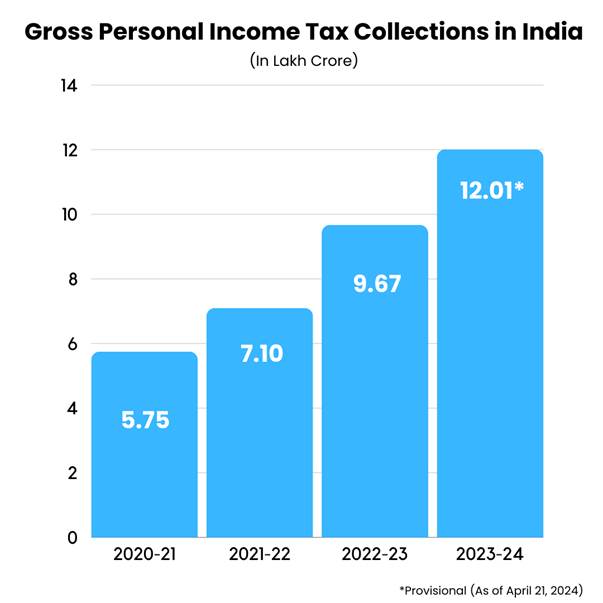
By 2023-24, the personal income tax collections, including STT, had surged to an impressive ₹12.01 lakh crore (provisional, as of April 21, 2024)). This significant increase underscores the resilience and robustness of the Indian economy, along with improved taxpayer compliance and the government's efforts to broaden the tax base. The upward trajectory of PIT collections highlights the crucial role of income tax in supporting India's economic infrastructure and public welfare programs.
Budget 2024-25: Income Tax Slab Changes
The Budget for 2024-25 introduced several changes to the income tax regime to benefit salaried employees and pensioners. The standard deduction for salaried employees was increased from ₹50,000 to ₹75,000 for those opting for the new tax regime. Similarly, the deduction on family pension for pensioners was enhanced from ₹15,000 to ₹25,000. Additionally, assessments can now be reopened beyond three years, up to five years from the end of the year of assessment, only if the escaped income is more than ₹50 lakh. The revised tax regime provides significant benefits, with salaried employees potentially seeing benefits of up to ₹17,500 in income tax.
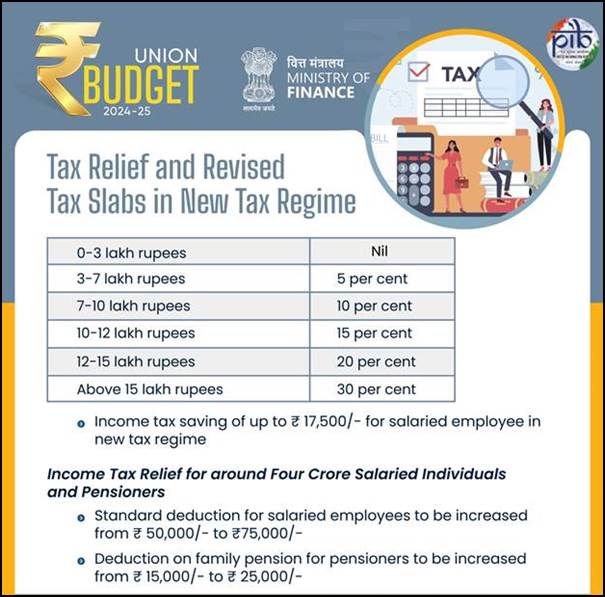
Other Notable Initiatives
The Central Government has undertaken several steps to boost tax collection and expand the tax base by curbing tax evasion, widening/deepening the tax base, promoting voluntary compliance through the use of technology, and promoting digital transactions. Some of the steps taken by the Government are as follows:
Simplification of the Personal Income Tax
- Finance Act, 2020: Provided an option to individual taxpayers for paying income tax at lower slab rates if they do not avail of specified exemptions and incentives.
- Finance Act, 2023: Increased the scope and reduced the rates applicable to individuals by providing that with effect from the assessment year 2024-25, the rates under section 115BAC(1A) of the Income-tax Act, 1961, shall be the default rates.
New Form 26AS
- Contains all information on the deduction or collection of tax at source, specified financial transactions (SFT), payment of taxes, demand and refund, etc.
- Details of SFT data in Form 26AS make taxpayers aware of their transactions beforehand, encouraging them to disclose their true income.
Pre-filling of Income Tax Returns (ITR)
To make tax compliance easier, pre-filled ITRs have been provided to individual taxpayers. The scope includes information such as salary income, bank interest, dividends, etc.
Updated Return
Section 139(8A) of the Act: Facilitates taxpayers to update their return anytime within two years from the end of the relevant assessment year, allowing them to file an updated return by voluntarily admitting omissions or mistakes and paying an additional tax as applicable.
E-Verification Scheme
This scheme enables authorities to collect information for the accurate and comprehensive determination of a taxpayer's income to reduce tax evasion. It provides taxpayers with relevant financial information collected from various sources.
Setting Up of Dispute Resolution Committee (DRC)
For reducing litigation and giving an impetus to dispute resolution for small taxpayers, a DRC has been constituted. Taxpayers with taxable income up to ₹50 lakh and disputed income up to ₹10 lakh are eligible to approach the Committee. The procedure is conducted on a digital platform under the e-Dispute Resolution Committee Scheme, 2021.
Expansion of Scope of TDS/TCS
To bring new taxpayers into the income tax net, the scope of TDS/TCS was expanded to include huge cash withdrawals, foreign remittance, purchase of luxury cars, e-commerce participants, and the sale of goods.
Income Tax Returns
Income Tax Return (ITR) is a form that individuals are required to submit to the Income Tax Department of India. It contains information about the person’s income and the taxes to be paid on it during the year. Information filed in ITR should pertain to a particular financial year, starting on 1st April and ending on 31st March of the following year.
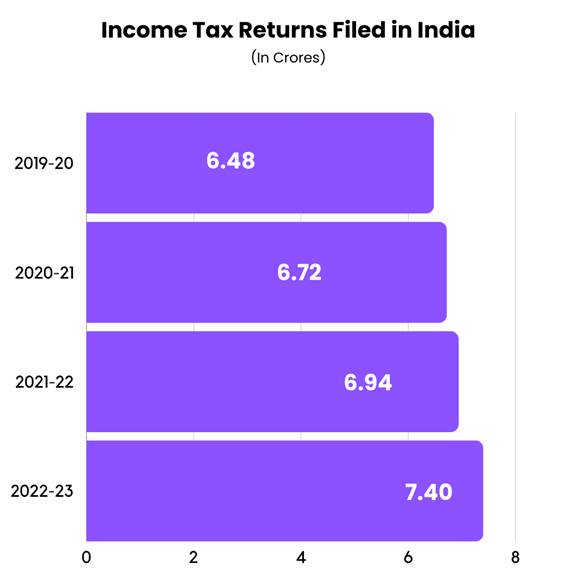
Number of persons who filed income tax returns in the last four years:
2019-20: 6.48 crore
2020-21: 6.72 crore
2021-22: 6.94 crore
2022-23: 7.40 crore
These figures reflect a consistent increase in the number of individuals filing their income tax returns, indicating an expanding tax base and improved tax compliance.
Conclusion
As India observes Income Tax Day 2024, it is evident that the nation's tax administration has come a long way since its inception in 1860. The journey from a rudimentary tax system to a sophisticated, technology-driven framework is a testament to the country's progress. This day also serves as a reminder of the historical evolution of tax administration in India and the ongoing reforms that aim to enhance tax compliance and simplify the process for taxpayers. The substantial increase in personal income tax collections, alongside the recent changes introduced in the 2024-25 Budget, reflects the government's commitment to a fair and efficient tax system. By improving deductions, revising tax slabs, and expanding digital and procedural innovations, the government continues to strengthen its approach to taxation. Income Tax Day is not only a celebration of our fiscal heritage but also an opportunity to acknowledge the vital role that taxation plays in supporting public services and national development. As we look to the future, the progress made in tax administration and the proactive measures taken to address challenges will undoubtedly contribute to a more robust and equitable economic framework, fostering a prosperous and sustainable future for all.